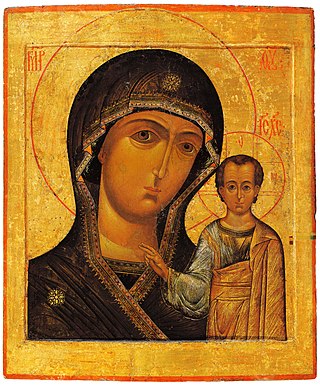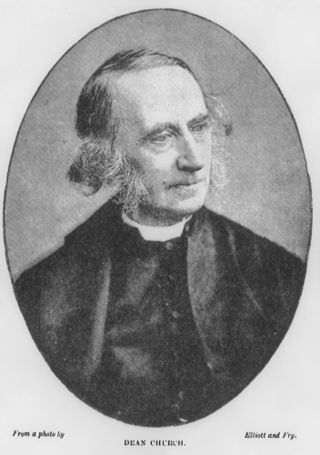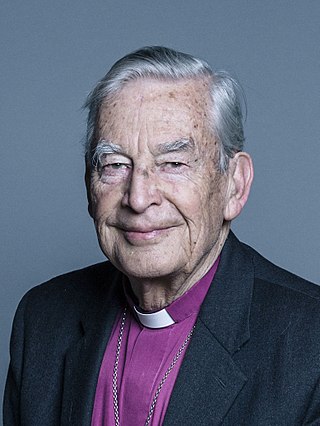
The Epistle of James is a general epistle and one of the 21 epistles in the New Testament. It was written originally in Koine Greek.

The Epistle to the Romans is the sixth book in the New Testament, and the longest of the thirteen Pauline epistles. Biblical scholars agree that it was composed by Paul the Apostle to explain that salvation is offered through the gospel of Jesus Christ.

Giovanni di Pietro di Bernardone, known as Francis of Assisi, was an Italian mystic, poet, and Catholic friar who founded the religious order of the Franciscans. Inspired to lead a Christian life of poverty, he became a beggar and itinerant preacher.

Theotokos is a title of Mary, mother of God, used especially in Eastern Christianity. The usual Latin translations are Dei Genitrix or Deipara. Familiar English translations are "Mother of God" or "God-bearer" – but these both have different literal equivalents in Greek, Μήτηρ Θεοῦ and Θεοφόρος respectively.

The Council of Ephesus was a council of Christian bishops convened in Ephesus in AD 431 by the Roman Emperor Theodosius II. This third ecumenical council, an effort to attain consensus in the church through an assembly representing all of Christendom, confirmed the original Nicene Creed, and condemned the teachings of Nestorius, Patriarch of Constantinople, who held that the Virgin Mary may be called the Christotokos, "Christ-bearer" but not the Theotokos, "God-bearer". It met from 22 June to 31 July 431 at the Church of Mary in Ephesus in Anatolia.

Thomas Müntzer was a German preacher and theologian of the early Reformation whose opposition to both Martin Luther and the Catholic Church led to his open defiance of late-feudal authority in central Germany. Müntzer was foremost amongst those reformers who took issue with Luther's compromises with feudal authority. He was a leader of the German peasant and plebeian uprising of 1525 commonly known as the German Peasants' War.

Richard William Church was an English churchman and writer, known latterly as Dean Church. He was a close friend of John Henry Newman and allied with the Tractarian movement. Later he moved from Oxford academic life to some prominence in the Church of England.

Frederick III, also known as Frederick the Wise, was Prince-elector of Saxony from 1486 to 1525, who is mostly remembered for the protection given to his subject Martin Luther, the seminal figure of the Protestant Reformation. Frederick was the son of Ernest, Elector of Saxony and his wife Elisabeth, daughter of Albert III, Duke of Bavaria.

Richard Douglas Harries, Baron Harries of Pentregarth, FLSW is a retired bishop of the Church of England and former British Army officer. He was the Bishop of Oxford from 1987 to 2006. From 2008 until 2012 he was the Gresham Professor of Divinity.

On the Jews and Their Lies is a 65,000-word anti-Judaic treatise written in 1543 by the German Reformation leader Martin Luther (1483–1546).
Lutheranism as a religious movement originated in the early 16th century Holy Roman Empire as an attempt to reform the Catholic Church. The movement originated with the call for a public debate regarding several issues within the Catholic Church by Martin Luther, then a professor of Bible at the young University of Wittenberg. Lutheranism soon became a wider religious and political movement within the Holy Roman Empire owing to support from key electors and the widespread adoption of the printing press. This movement soon spread throughout northern Europe and became the driving force behind the wider Protestant Reformation. Today, Lutheranism has spread from Europe to all six populated continents.
To the Christian Nobility of the German Nation is the first of three tracts written by Martin Luther in 1520. In this work, he defined for the first time the signature doctrines of the priesthood of all believers and the two kingdoms. The work was written in the vernacular language German and not in Latin.

Martin Luther was a German priest, theologian, author, hymnwriter, professor, and Augustinian friar. Luther was the seminal figure of the Protestant Reformation, and his theological beliefs form the basis of Lutheranism. He is widely regarded as one of the most influential figures in Western and Christian history.

The First Epistle of Clement is a letter addressed to the Christians in the city of Corinth. The work is attributed to Clement I, the fourth bishop of Rome and almost certainly written by him. Based on internal evidence some scholars say the letter was composed some time before AD 70, but the common time given for the epistle's composition is at the end of the reign of Domitian. It ranks with Didache as one of the earliest, if not the earliest, of extant Christian documents outside the traditional New Testament canon. As the name suggests, a Second Epistle of Clement is known, but this is a later work by a different author. Part of the Apostolic Fathers collection, 1 and 2 Clement are not part of the canonical New Testament.
This is a selected list of works by and about Martin Luther, the German theologian. The emphasis is on English language materials.

Frank Weston (1871–1924) was the Anglican Bishop of Zanzibar from 1907 until his death 16 years later.
David John Atkinson is the former Bishop of Thetford.

In Christian eschatology, Antichrist refers to a kind of person prophesied by the Bible to oppose Jesus Christ and falsely substitute themselves as a savior in Christ's place before the Second Coming. The term Antichrist is found four times in the New Testament, solely in the First and Second Epistle of John. Antichrist is announced as one "who denies the Father and the Son."

Laurence Alexander "Laurie" Green is a retired British Anglican bishop. He was the Bishop of Bradwell from 1993 to 2011.

Rachel Treweek is an English Anglican bishop who sits in the House of Lords as a Lord Spiritual.















